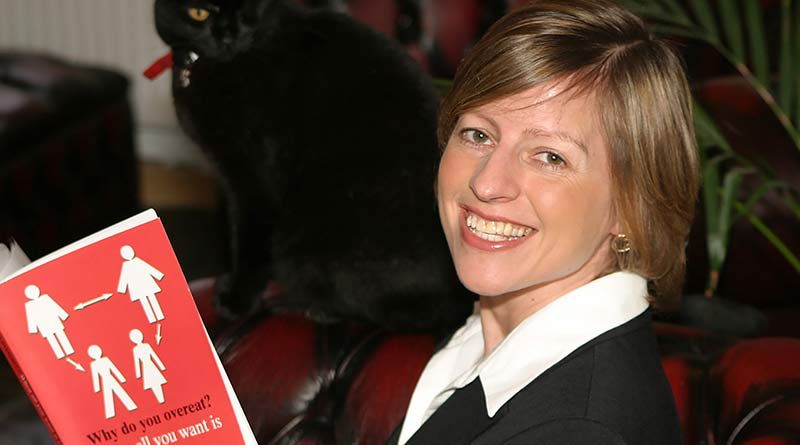Why do you overeat?

Introduction
We’ve got a break from dissecting academic papers this week as it is almost 20 years to the day since my first book was published. It was called “Why do you overeat? When all you want is to be slim” and it was launched at the London Book Fair on 15th March 2004. The photo shows the cover back then. The book was revised and republished at the end of 2012 (Ref 1). I could have written the book many years earlier than I did. I’ll close this note by sharing how it came to be written.
My first interest in anything food related started when my brother, Adrian, developed type 1 diabetes. He was 15 and I was 13. I witnessed him drop 20 pounds in as many days. Looking back, the diagnosis took unnecessarily long. The characteristics of being a teenager, dramatic weight loss and insatiable thirst should have been so obvious, but this was years ago, and diabetes was not constantly in the news as it is now.
When Adrian was admitted to hospital, we were given a family training session to understand the difference between a state of hypoglycaemia (low blood glucose levels) vs. hyperglycaemia (high blood glucose levels). As soon as Adrian came home, I helped my big brother inject insulin into his body and started to make the obvious connection between insulin, carbohydrate and weight.
The family diet changed overnight – gone were the high teas, with scones and cake, from my parents’ upbringing and in came ‘meat and two veg’ kind of meals. The dietary advice for diabetics then was not too bad. It deteriorated over the years, as first the Balance of Good Health plate was introduced and then the ‘Eatwell’ plate and then the ‘Eatwell’ guide (Ref 2).
Later in my teenage years came the next issue to stimulate my interest in food. I was at a Corpus Christi college, Cambridge University reunion the weekend of 8th March 2024, and I sat next to a medic who was in her final year. We had a fascinating conversation about how things had changed since I was at Corpus. One thing that we realised had not changed was high achieving women having troublesome relationships with food. My medic friend also observed that men have body pressures now, similar but different to women, which were not apparent in my day. While women seem to want to take up as little space as possible, men are trying to bulk up. She noted that men are spending hours in the gym trying to achieve a ‘ripped’ look and they are often consuming excess protein, which is where she comes in as a medic – dealing with the consequences of extreme examples of this.
I was junior president of the college in my final year. In the year before that I was women’s officer. Each college had a women’s officer – Corpus just didn’t start this tradition until they realised (in 1983/4) that women should be admitted to the college. It had only taken them since 1352 to do this!
Being a college women’s officer involved dealing with issues that might affect women at the college level and collaborating with other college women’s officers at the university level. At a college level I achieved changes to formal invitations to include dress codes for women. The invites used to say, “White tie”, “Black tie”, or “Lounge suit.” The women had not a clue what to wear. Corpus soon had white tie/ball gown, black tie/cocktail dress, lounge suit/day dress – not too challenging for the organisers and hugely valued by young women who never know what to wear at the best of times.
The university women’s officer role involved (I’m sorry to say) making rape alarms and self defence classes available. We didn’t have traceable transport apps or simple ways to text/call to say we were home safely. The university also provided information on eating disorders. There were only 20 women in my year at Corpus. I remember reading the information and thinking “a lot of that applies to me.” I thought I was the only person trying to control my eating, overeating at times, getting scared at the thought of these enormous ‘super hall’ dinners we so frequently had. Cambridge life seemed to revolve around food. I put a note in the pigeonholes of my fellow female students saying that I had this information and, if anyone wanted to borrow it, I was in room 12KP or I could leave it in their pigeonhole if they wanted to remain anonymous. Virtually every women in my year came to see me. It was such a relief for all of us that we knew we weren’t the only ones having trouble with food.
It was while at Cambridge that I found myself becoming addicted to certain foods. It was never the lobster bisque and rack of lamb at these posh dinners. It was the breads and cakes at Fitzbillies patisserie – cruelly within a stone’s throw of Corpus (and still there). It was also the sweets and crisps in the newsagents opposite Corpus. This was when I first started to ask the question – why am I doing this? I’m more than half bright. So, why do I overeat when all I want is to be slim?

